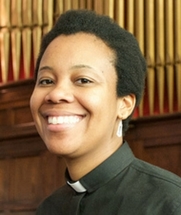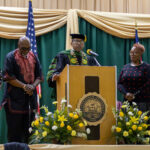Reflections on the Women’s March
Rev. Jennifer Bailey, 4th Episcopal District
In 1965, Brown Chapel African Methodist Episcopal (AME) Church in Selma, Alabama opened its doors as a base of operations for the Southern Christian Leadership Council (SCLC) and Student Non-Violent Coordinating Committee (SNCC) as they crafted the strategy for and mobilized engagement in the Selma campaign for voting rights. From the steps of the now historic Church, Hosea Williams and John Lewis led 600 marchers across the Edmund Pettus Bridge to the massacre that would become known as “Bloody Sunday.” Televised images of the March and massacre brought the horrors of racial terrorism into the living rooms of the American public as brutal images of bloodied and severely injured marchers dominated the evening news.
I first walked the labyrinth of Brown Chapel’s sacred halls as part of the 50th Anniversary commemoration of the Selma marches in March 2015. I went to pay homage to the ancestors whose tireless work laid the foundation for the work I do today as founder of the Faith Matters Network, a non-profit social justice collective committed to catalyzing the leadership of marginalized communities throughout the American South. As a young African American clergywoman, the significance of the space was not lost on me. In a world where it is still controversial to claim that #blacklivesmatter, progress must not be confused with victory. Television images have been replaced by viral videos of black people dying at the hands of police. Sandra Bland, Alton Sterling, Philando Castile, we say your names.
Today, my ministry cannot be separated from my commitment to equity. Over the past several years that has meant taking to the streets alongside beloved brothers and sisters in acts of protest and civil disobedience on a range of issues from police brutality to climate justice. On January 21, 2017, I joined millions of men, women, and gender non-conforming global citizens in the streets as part of the Women’s March movement. It was not an easy decision. For many years, the “women’s movement” has rendered invisible the experiences and challenges facing women of color and black women in particular. Nearly 57% of white women voted for President Trump despite the hateful and hurtful rhetoric he employed throughout the 2016 presidential campaign attacking immigrants, refugees, sexual assault victims, and “the blacks.” I nodded in agreement with my black feminist and womanist friends who opted out of once again being called to stand in solidarity with white women who rarely stand in solidarity with us. Even the origins of the Women’s March on Washington felt suspect as once again three women of color, Linda Sarsour, Carmen Perez, and Tameka Mallory, were called in to fix the mess created by the original, predominantly white, planning committee when critiques about the racial composition of the March leadership were levied.
Yet even with these doubts, as a young adult and clergywoman, I felt convicted to attend. Often in the spaces that seek to center the experiences of women, the loudest religious voices are those that seek to limit the rights of women and silence their concerns. So I went to the Women’s March in Nashville, Tennessee with two friends from Divinity School. Adorned in my clerical collar and holding a sign with a quote from black feminist scholar Audre Lorde, I was struck by how many people said thank you. Not many clergy wearing the visible signs of our faith were present so I offered prayers, chanted scriptures, and stood to block counter protesters using biblical quotes to condemn us all to hell.
It would be easy submit to the seduction of hopelessness in this political moment and cower in the face of uncertainty. Yet, that day at the Women’s March reminded me that as a Christian, I am a prisoner of hope. I believe in the possibility of transformation, salvation, and deliverance because they are the stuff that comprises my faith. I know this path to freedom will not happen alone. It will require all of us to dig deep, bridge our divides, surface the best of ourselves, and give it to one another. It will require a naming of that which is right and wrong even within movement space where we may agree on the substance of the concerns but not the strategy. It will require us holding in loving accountability those with whom we share common concerns when they ignore the concerns of those whose voices have been pushed to the margins.
It will require that we follow in the footsteps of the young leaders of the past and not allow our silence to become a betrayal of that which we hold dear. The soul of our democracy is at stake. Which path will we choose?





